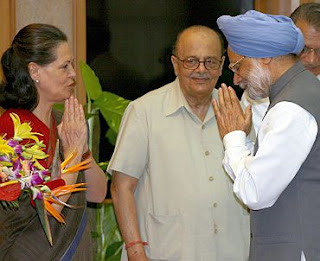 Veteran congress leader Arjun Singh, a staunch secularist and loyalist of the Gandhi family, died in New Delhi on Friday following a cardiac arrest. The 80- year-old Singh had been unwell for long. Ironically, his end came just four hours after he was dropped from the high-powered Congress Working Committee (CWC), which was reconstituted in the afternoon.
Veteran congress leader Arjun Singh, a staunch secularist and loyalist of the Gandhi family, died in New Delhi on Friday following a cardiac arrest. The 80- year-old Singh had been unwell for long. Ironically, his end came just four hours after he was dropped from the high-powered Congress Working Committee (CWC), which was reconstituted in the afternoon.In view of his services to the party, Congress president Sonia Gandhi had accommodated him in the category of ‘permanent invitee’ to the CWC.
Singh was the human resource development minister in the P.V. Narasimha Rao government, but quit during the turbulent days of 1994. Subsequently, he formed Congress (T) along with other senior leaders such as N.D. Tiwari and Sheila Dikshit. He was also very critical of the Babri Masjid demolition and the handling of the crisis by Rao.
The plan to form Congress (T) reportedly also had a hidden motive — to create a platform for Sonia’s entry into politics. A reluctant Sonia eventually became the Congress president, replacing a lacklustre Sitaram Kesri when the party was on the verge of disintegration.
Singh, considered a master manipulator of power politics, returned to the party soon after and was a ‘Chanakya’ to Sonia in the initial days. He entered politics in the late Fifties and rose in the hierarchy because of his ability to win friends and influence people.
Singh was the chief minister of Madhya Pradesh between 1980 and 1985. In 1985, he was sent as governor to Punjab at the height of militancy. As the governor, Singh was the architect of the Rajiv-Longowal accord, which paved the way for ending militancy in the state. It was a reflection of Rajiv Gandhi’s trust in him that he went out of his way and created the post of vicepresident in the party for Singh.
In 1988, Singh became MP CM for the second time. However, his ties with the Gandhi family began to nosedive after the UPA- I was elected to power. After Sonia declined to accept the job of Prime Minister, an ambitious Singh set his eyes on the coveted post. He was rattled when she chose Manmohan Singh. He was all the more upset when he was dropped even from the UPA- II cabinet.
His stock in the Congress had fallen to such an extent by then that the party even refused to give his daughter Beena Singh a ticket in the last Madhya Pradesh assembly elections. A pro- minority face in the Congress and the government, Singh was even ridiculed by many for his unflinching loyalty to the Gandhi family and was often called a sycophant. He was one of the first senior party leaders who talked about Rahul Gandhi taking over as Prime Minister.
Considered an astute politician, he took many pro- minority steps in his various political avatars. Singh also had his share of controversies.
He was the chief minister of MP when the Bhopal gas tragedy took place. He got a lot of flak for his failure to manage the crisis and was also accused of playing a role in the release of Union Carbide chief Warren Anderson. The Churhat lottery scandal was another blot on his chief ministership.
As the HRD minister in the UPA- I government, his stand on the OBC quota issue invited a lot of criticism. He was the Congress’s answer to the regional politicians who tried to use the caste- based reservation policy for vote bank politics.
When this reporter met him a few months ago and sought his views on certain controversial political developments, Singh said the media and the political class should wait for his autobiography.
“ I am writing an autobiography, it will be out sometime in March (2011). Wait for it,” he said.
Of late, the Congress leader had been struggling with heart disease and was undergoing treatment at the All India Institute of Medical Sciences AIIMS). He was admitted to AIIMS on January 29 this year.
“ He had undergone a bypass surgery. Post- surgery, he was suffering from hypertension and cholilithiasis with a non- functional gall bladder. He had bladder stones, Type- 2 diabetes mellitus and diabetic nephropathy,” AIIMS spokesperson Dr Y. K. Gupta said.
0 comments:
Post a Comment